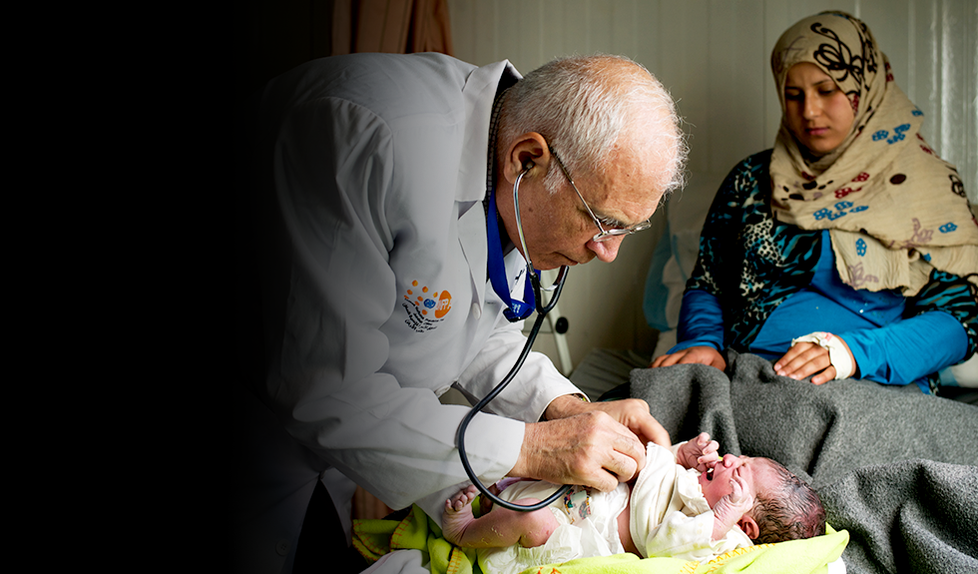 Strengthening Reproductive Health in Humanitarian Settings
Developing capacities in SRH service delivery in emergency situations
Strengthening Reproductive Health in Humanitarian Settings
Developing capacities in SRH service delivery in emergency situations

Challenges
In 2017, it was estimated that 13.5 million people in the Syrian Arab Republic, including 4.1 million women of reproductive age and 360,000 pregnant women, needed humanitarian support. Seven years of crisis had led to some 5.1 million people living in hard-to-reach and besieged areas with limited access to basic health services, including reproductive health. Furthermore, more than 50 per cent of health facilities were destroyed completely or partially.
The on-going crisis had adversely affected the delivery of quality reproductive health services. The need for skilled human resources, especially qualified and trained midwives, was huge. The majority served in major cities and more than a quarter of them would be retiring within the next two years. Moreover, many midwives have either perished or forcibly displaced, or have left the country.
To cover maternal health care needs across the Syrian governorates, the current midwifery cadre should increase by 40 to 50 per cent. There was also a need to strengthen the capacities of midwives, who were not only saving lives in difficult circumstances but at the same time contributing to a long-term solution to maternal mortality and a sustainable health system.
Towards a Solution
To strengthen access to quality maternal health care, UNFPA in partnership with the Ministry of Health of the Syrian Arab Republic, organized a cross-country exchange of knowledge and experience mission for reproductive health professionals to the Islamic Republic of Iran. The objective was to enhance the understanding of the participants on best practices in reproductive health service delivery, especially by midwives in an emergency and humanitarian context, as well as in a post-crisis era. The choice of the Islamic Republic of Iran was based on the country’s revitalized reproductive health programme, particularly its well-developed midwifery programme, as well as the uncomplicated travel procedures for Syrians.
Results
The Syrian health professionals, especially the midwives, have benefitted from the Iranian experiences in reproductive health service delivery in both developmental and humanitarian contexts. These include, among others, pre-natal, post-natal and safe deliveries in hospitals and facilities, neonatal care and resuscitation, when needed, and emergency obstetric care services. The Iranian Red Crescent Society’s experience in reproductive health service provision in emergencies was especially useful. On the other hand, the exchange enabled the Iranian health professionals to understand and appreciate the roles, conditions of work and security risks that Syrian health workers face on a day to day basis, among other challenges.
As a result of the mission, an agreement between the Government of the Syrian Arab Republic and the Government of the Islamic Republic of Iran was initiated to support the health system in the Syrian Arab Republic, including reproductive health. Moreover, the visits to academic and medical institutions in the Islamic Republic of Iran led to a comprehensive and thorough review and updating of the Syrian midwifery curriculum. Academic and operation research relating to reproductive health and service delivery is also being discussed with the University of Tehran.
Other missions to the Islamic Republic of Iran are being explored under the South-South cooperation umbrella to enhance the skills of health care providers to perform in vitro fertilisation to enable women to have better reproductive health options, to learn more about public private partnerships in reproductive health and a training course on civil registration and vital statistics systems.
Lessons Learned
The success of this exchange is based on its participatory approach, including the active engagement of high-ranking officials in the Ministry of Health of both countries. The Minister and Deputy Minister of Health in the Syrian Arab Republic were involved right from the beginning in planning and overseeing the study tour up to the follow up phase of the mission. Likewise, for learning to be incorporated into practice, the participation of Syrian senior staff in the cross-country exchange, such as the Head of Autonomous Hospital and the Head of Nursing and Midwifery Programme, was vital.
Contact Information
Countries involved
Supported by
Implementing Entities
Project Status
Project Period
URL of the practice
Primary SDG
Secondary SDGs
Similar Solutions
| NAME OF SOLUTION | Countries | SDG | Project Status | |
|---|---|---|---|---|
A Billion Brains: Smarter Children, Healthier Economies High Level Meeting on South-South Cooperation for Child Rights |
Iran (Islamic Republic of), Syrian Arab Republic | 17 - Partnerships for the Goals | Completed | View Details |
Accelerating the Implementation of African Union Treaties in São Tomé and Príncipe South-South learning from the Beninese judicial system’s experience in the application of human rights treaties to its national law |
Iran (Islamic Republic of), Syrian Arab Republic | 05 - Gender Equality | Completed | View Details |
Accelerating the Transformational Shift to a Low-Carbon Economy in Mauritius Towards supplying 35 percent of the country’s energy needs with renewables by 2025 |
Iran (Islamic Republic of), Syrian Arab Republic | 05 - Gender Equality 09 - Industry, Innovation and Infrastructure 13 - Climate Action | Ongoing | View Details |
Access to Justice through e-Services and Dematerialized Case Management Scaling up connectivity and unlocking the digital potential of judicial institutions to enhance access to justice for all |
Iran (Islamic Republic of), Syrian Arab Republic | 05 - Gender Equality | Completed | View Details |
ACP Business-friendly Supporting business-friendly and inclusive national and regional policies, and strengthening productive capabilities and value chains |
Iran (Islamic Republic of), Syrian Arab Republic | 08 - Decent Work and Economic Growth 17 - Partnerships for the Goals | Ongoing | View Details |
